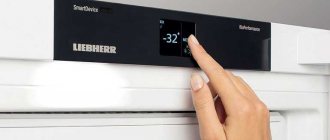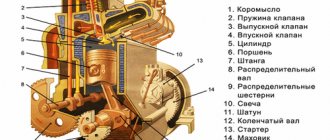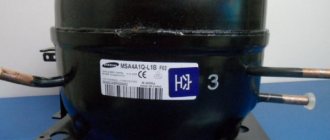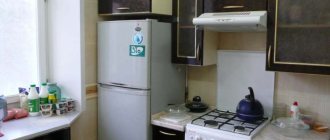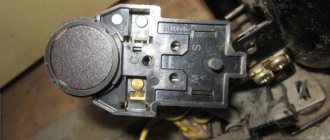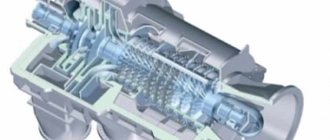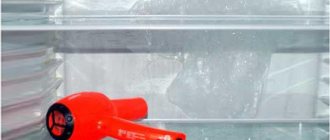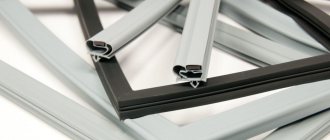Obviously, one of the most important items in any kitchen is the refrigerator. Surely many remember what careful care it was subjected to before: the refrigerator had to be defrosted periodically so that too large an ice layer did not form on its back wall, it was necessary to wash it quite often and monitor every incomprehensible sound, because any strange sound could mean an impending breakdown.
Nowadays, the situation has, of course, changed somewhat. Thanks to modern cooling systems, there is no longer a need for defrosting, you don’t need to wash the refrigerator so often, and it doesn’t make any extraneous sounds, but then and now you can monitor its condition by another sign: heating of the compressor. But to what temperature does the refrigerator compressor heat up? How to determine the norm?
Compressor operating principle
In order to understand what heating temperature is critical for a compressor, it is worth understanding its operating principle.
During operation, a fairly high compressor temperature is normal. Its values can reach 60 degrees Celsius, with increased load – up to 90 degrees. The reason for this heating is that during operation this part is subjected to fairly high loads.
The low temperature in the refrigerator is ensured due to the chemical properties of freon or its analogues. The flow of this substance enters the compressor, which, in turn, compresses the freon and directs it to the condenser. Next, the freon is cooled in the condenser, turning into a liquid state. Liquid freon is sent further through the cooling system, eventually returning to the compressor in a gaseous state.
The compressor operates periodically: the quiet period and the operating period are determined. Active work occurs until the required temperature is reached. That is why, when you turn on the refrigerator for the first time, it is not recommended to load it with warm food. Some refrigerators are equipped with a mechanism that allows you to turn off the compressor, thereby ensuring a longer life of the refrigerator.
Causes of malfunctions
Naturally, every malfunction occurs for one reason or another:
- The malfunction occurred due to the fact that the compressor does not turn off after reaching the desired temperature.
- The refrigerator operates in intensive mode. This situation is typical in the summer, in extreme heat.
- The heat exchanger is not working properly.
- There is a significant leak of freon, as a result of which the compressor is hot and the equipment does not work.
- The refrigerator light is broken.
- The electric motor is worn out, the equipment simply does not turn on.
- The refrigerator resumes operation after defrosting or there is too much food loaded into its space.
- The intensive freezing mode is loaded, and the refrigerator cannot cope with the stored volume of food.
- The thermostat is set to the maximum position.
If the conditions recommended by the manufacturer are violated while using the refrigerator, this will also lead to compressor failure.
Frequent opening of the device is the cause of breakdown
Frequent violations that provoke a situation when the refrigerator does not work and the compressor is hot include:
- frequent door opening;
- installation of equipment close to walls;
- the refrigerator is exposed to direct sunlight;
- hot foods are placed in the refrigerator or freezer, from which intense evaporation occurs;
- the equipment is located close to the heating system;
- defrosting is not carried out in a timely manner.
Among the malfunctions, of course, there may be elementary breakdowns: a burnt-out light bulb, poorly functioning lighting, accumulation of melt water in the tray, and there are those that are unlikely to be dealt with without the help of a professional. But you should not immediately call a specialist if the compressor gets very hot. Most likely, work will return to normal very soon. But if the refrigerator does not work and the compressor is hot, then this is a cause for concern. It is recommended to independently analyze the situation and your recent actions. This will help the technician complete repair work faster and with better quality.
It’s hard to imagine home life without a refrigerator, since even a small one for 3-12 hours can lead to food spoilage. Therefore, they usually listen to the operation of this unit and check its condition. So, when even minor breakdowns are detected, they try to eliminate them as soon as possible so that they do not cause more serious problems with household appliances. One of the signs of possible problems is a hot refrigerator compressor. About what the increased temperature of the compressor indicates and what to do in this situation, further in the material.
Hot sides of the refrigerator
If the sides of the refrigerator heat up, and not the back, there is no need to sound the alarm either. It is better to become familiar with the mechanics of the device of a particular model, because the network of tubes that provides cooling can be located on the sides, that is, in the side walls. And since this does not change the mechanics of operation and the compressor also heats up during operation, the walls where the cooling system is located also heat up.
However, if the compression unit is located on the back wall of the refrigerator, this may be an alarming signal and indicate a problem.
The influence of external factors should also not be excluded. So, if the refrigerator is located near an oven or stove, the sides may heat up under the thermal influence of these appliances. Such exposure can negatively affect the performance of the refrigerator, so placing these items nearby should be avoided.
Should the compressor and motor in the refrigerator be hot?
Obviously, the compressor performs a rather complex function, which is why heating occurs. Indeed, in order to achieve the required state of aggregation of the coolant, very high pressure has to be applied. In addition, the coolant transfers a certain amount of thermal energy.
As for the refrigerator motor, it is also normal to heat up. To operate a refrigerator, it is necessary to generate a sufficiently large amount of electric current, which entails heating.
But don't forget that excessive heat is not normal. And if suspicions arise about this, then it is better to measure the temperature of these elements.
How hot can a compressor get?
The heating of the compressor depends on the load on the refrigerator. Loads both external and internal. A normal temperature is 60 degrees Celsius. But in the case of a hot season or when placing hot foods in the refrigerator, it can rise to 90 degrees.
The greater the load on the cooling system, the higher the temperature. But it is worth noting that if there is no increased load, and the compressor temperature remains at high values for a long time, this is a cause for concern. After all, this is the surest sign that the device is not working correctly.
Causes of malfunctions
Naturally, every malfunction occurs for one reason or another:
- The malfunction occurred due to the fact that the compressor does not turn off after reaching the desired temperature.
- The refrigerator operates in intensive mode. This situation is typical in the summer, in extreme heat.
- The heat exchanger is not working properly.
- There is a significant leak of freon, as a result of which the compressor is hot and the equipment does not work.
- The refrigerator light is broken.
- The electric motor is worn out, the equipment simply does not turn on.
- The refrigerator resumes operation after defrosting or there is too much food loaded into its space.
- The intensive freezing mode is loaded, and the refrigerator cannot cope with the stored volume of food.
- The thermostat is set to the maximum position.
If the conditions recommended by the manufacturer are violated while using the refrigerator, this will also lead to compressor failure.
Frequent opening of the device is the cause of breakdown
Frequent violations that provoke a situation when the refrigerator does not work and the compressor is hot include:
- frequent door opening;
- installation of equipment close to walls;
- the refrigerator is exposed to direct sunlight;
- hot foods are placed in the refrigerator or freezer, from which intense evaporation occurs;
- the equipment is located close to the heating system;
- defrosting is not carried out in a timely manner.
Among the malfunctions, of course, there may be elementary breakdowns: a burnt-out light bulb, poorly functioning lighting, accumulation of melt water in the tray, and there are those that are unlikely to be dealt with without the help of a professional. But you should not immediately call a specialist if the compressor gets very hot. Most likely, work will return to normal very soon. But if the refrigerator does not work and the compressor is hot, then this is a cause for concern. It is recommended to independently analyze the situation and your recent actions. This will help the technician complete repair work faster and with better quality.
To accurately understand all the reasons for the compressor overheating in a refrigerator, you should understand the operating principle of this device. Its main task comes down to pumping thermal energy from one area to another, or more precisely, from the freezer and into it. So why can the compressor be hot when running? The operating diagram is shown in the photo.
Why is the refrigerator compressor hot?
If we talk specifically about compressor overheating, there are several reasons that lead to this:
- Deformation or damage to the heat exchanger.
- Activation of the deep freezing function, which entails long-term continuous operation of the compression unit.
- Setting the refrigerator temperature too low, requiring the compressor to work harder to maintain it.
- Placing a large amount of warm or hot food in the refrigerator causes the refrigerator temperature to rise.
- Thermal influence of the environment, for example, nearby ovens, stoves.
- The door is not tightly closed. Air from outside continuously enters the refrigerator, which leads to an increase in temperature and, as a result, an increase in the load on the compressor.
- Frequent opening of the refrigerator. Just as in the case of a door that is not tightly closed, the temperature increases due to the entry of warm air.
- A malfunction of the temperature sensor, which leads to non-stop operation, regardless of the temperature in the refrigerator.
- Ignoring defrosting rules. Too much ice has a negative impact on the cooling system.
- Wear of cooling system elements.
- Damage to the tubes through which the coolant moves.
In the case of a compressor failure, you can observe the following:
- the compressor turns on and immediately turns off;
- warm or hot air enters the refrigerator;
- an ice cap forms faster in the refrigerator compartment;
- upon contact, the walls of the refrigerator receive an electric shock;
- condensation appears.
More about the process
Compressor operating temperature
Like most electrical appliances, the compressor has a certain operating standard, that is, a temperature at which its operation is not disrupted. Typically this temperature is 60-90 degrees Celsius. From this we can conclude that the compressor may be hot during operation. However, if the device gets hotter, this indicates a malfunction.
If you notice a problem with your refrigerator, you should immediately contact a professional. This may be an equipment repair company, or you can contact the store where you purchased the device for a warranty card. But if you apply for repairs under warranty, you may be denied if there is mechanical damage, so during the warranty period, use the refrigerator as carefully as possible.
Causes of compressor overheating
The main reasons for a hot compressor in a refrigerator:
- Neglect of defrosting rules. One of the most common causes of compressor overheating is a thick layer of ice on the wall of the refrigerator.
- Incorrectly placed products. You cannot lean metal or plastic dishes against the back walls of the refrigerator, because the compressor will have to cool these containers in addition to other products, which leads to an increase in the temperature of the compressor.
- The refrigerator compartment is too overloaded. When you load a lot of food into the refrigerator, air circulation is disrupted and the refrigerator begins to work harder, resulting in overheating.
- Placing uncooked food items. In this case, the compressor must work harder to return to the required temperature, and it cannot make stoppages that prevent it from overheating.
- Damage and breakdown of other elements of the refrigerator.
- Incorrect location of the refrigerator. Refrigerators should not be placed close to the wall or next to radiators, etc.
Using elements for too long. Do not forget that each element requires timely replacement.
